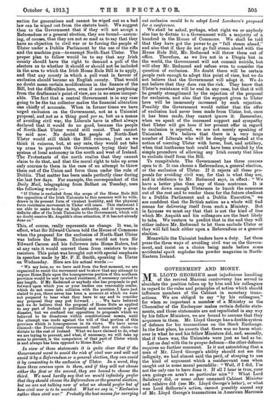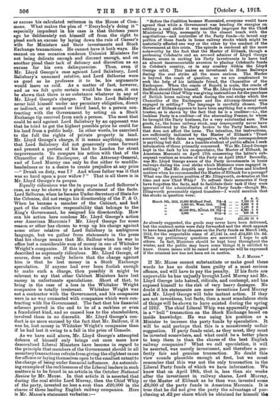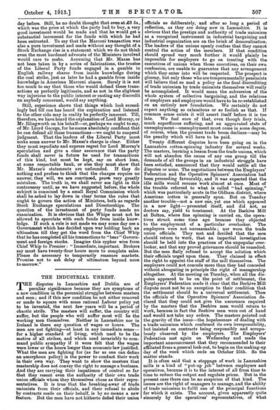GOVERNMENT AND MONEY.
MR. LLOYD GEORGE'S most injudicious handling of the revived Marconi controversy has served to elucidate the position taken up by him and his colleagues in regard to the rules and principles of action which should influence members of the Cabinet in monetary trans- actions. We are obliged to say " by his colleagues," for when so important a member of a Ministry as the Chancellor of the Exchequer makes certain definite state- ments, and those statements are not repudiated in any way by his fellow Ministers, we are bound to assume that they acquiesce in them. Mr. Lloyd George has a double system of defence for his transactions on the Stock Exchange. In the first place, he asserts that there was no harm what- ever in what he and his fellow Ministers did, and, secondly, that if there was, the Unionists were just as bad as he. Let us deal with the to quoque defence—the other defence requires no further comment. Is it not astonishing that a man of Mr. Lloyd George's ability should not see the indignity, we had almost said the peril, of stooping to use the kind of argument which a maidservant uses when caught out in some moral peccadillo : " Well, if I did, I'm not the only one to have done it. If all I hear is true, your own goings-on aren't so particular nice " ? What Lord Salisbury did, or some other unnamed Cabinet Minister and relative did (see Mr. Lloyd George's letter), or what was Lord Selborne's action, cannot possibly amend any of Mr. Lloyd George's transactions in American Maroons or excuse his calculated reticence in the House of Com- mons. What makes the plea of " Everybody's doing it " especially impudent in his case is that thirteen years ago be deliberately cut himself off from the right to plead such an excuse by laying down the rule of Caesar's wife for Ministers and their investments and Stock Exchange transactions. He cannot have it both ways. He cannot on one occasion condemn Unionist Ministers for not being delicate enough and discreet enough, and on another plead their lack of delicacy and discretion as an excuse for his own delinquencies. Thus, even if Mr. Lloyd George's case against Lord Salisbury, Lord Salisbury's unnamed relative, and Lord Selborne were as good as he professes it to be, his arguments would leave us cold. As a matter of fact, however, and as we felt quite certain would be the case, it can be shown that there is no substance whatever in any of Mr. Lloyd George's charges. The late Lord Salisbury never laid himself under any pecuniary obligation, direct or indirect, or at second or third hand, to a person con- tracting with the Government by acting on a Stock Exchange tip received from such a person. The most that could be said against Lord Salisbury by an opponent was that he tried to get the highest possible price he could for his land from a public body. In other words, he exercised to the full the rights of private property in land. Mr. Lloyd George's charge, if it means anything, means that Lord Salisbury did not generously come forward and present a portion of his land to London for street improvements. To compare his action with that of the Chancellor of the Exchequer, of the Attorney-General, and of Lord Murray can only be due either to muddle- headedness or to a desire to create prejudice at any price —" Drunk on duty, was I ? And whose father was it that was so hard upon a poor widow ? " That is all there is in Mr. Lloyd George's to quoque. Equally ridiculous was the to quoque in Lord Selborne's case, as may be shown by a plain statement of the facts. Lord Selborne, when he became Under-Secretary of State for the Colonies, did not resign his directorship of the P. Ss 0. When he became a member of the Cabinet, and had part of the collective responsibility that belongs to the King's Government, he resigned his directorship. How can his action here condone Mr. Lloyd George's action over American Marconis ? Mr. Lloyd George for some reason or other has chosen to wrap up his charge against some other relative of Lord Salisbury in ambiguous language, but we gather from statements in the press that his charge means that Mr. Balfour when he was in office lost a considerable sum of money in one of Whitaker Wright's companies. If this is his charge it can only be described as supremely ridiculous. Mr. Lloyd George, of course, does not really believe that the charge against him is that he lost money in a Stock Exchange speculation. If anyone had ever been foolish enough to make such a charge, then possibly it might be relevant to say that other Cabinet Ministers have lost money in unfortunate speculations. Short of that, to bring in the case of a loss in the Whitaker Wright companies is totally irrelevant. Whitaker Wright was not a contractor with the Government, and his companies were in no way connected with companies which were con- tracting with the Government. The fact that his financial schemes proved in the end to be of a reckless or even a fraudulent kind, and so caused loss to the shareholders, involved them in no discredit. Mr. Lloyd George's con- duct is no more excused by the fact that Mr. Balfour, if it was he, lost money in Whitaker Wright's companies than if he had lost it owing to a fall in the price of Consols.
As we have said above, Mr. Lloyd George's attempted defence of himself only brings out once more how demoralized Liberal Ministers have become in regard to the principle that members of the Government should in all monetarytransactions refrainfrom giving the slightest cause for offence or laying themselves open to the smallest extent to the charge of being under financial influences. An astonish- ing example of the recklessness of the Liberal leaders in such matters is to be found in an article in the October National Review by Mr. Masse. In that article it is asserted that during the coal strike Lord Murray, then the Chief Whip of the party, invested no less a sum than £20,000 in the shares of three leading English railway companies. Here is Mr. Maxse's statement verbatim:— " Before the Coalition became Marconied, everyone would have agreed that while a Government was bending its energies on settling a coal strike it was manifestly improper for the Chief. Ministerial Whip, necessarily in the closest touch with the negotiations—and controller of the Party funds—to invest any portion of those funds in home railway stocks which might be materially affected one way or the other by the conduct of the Government at this crisis. The episode is rendered all the more noteworthy by the fact that the Master of Elibank, though a professing Cobdenite and an avowed admirer of Lloyd George finance, seems in making his Party investments to have had an almost insurmountable aversion to placing Cobdenite funds in Cobden's country, or in any country within the Lloyd George orbit. This makes an investment in Home Railways during the coal strike all the more curious. The Master is beyond the reach of question, so we are constrained to seek the help of his intimate friend, the Chancellor of the Exchequer. When the oracle of Bogota is mute, the oracle of Bedford should bestir himself. Was Mr. Lloyd George aware that the Ministerial Chief Whip was giving instructions for the purchase of British home railway stock during the coal strike which the Chancellor of the Exchequer and the Attorney-General were engaged in settling ? The language is carefully chosen. The Master of Elibank appears to have been anything but a competent trustee, as is shown by the fact that he is a creditor—i.e., the luckless Party is a creditor—of the absconding Fenner, to whom he brought the Party business, for a very substantial sum. The goods, i.e., the home railway stock, may consequently never have been delivered by the Party broker to the Party banker, but that does not affect the issue. The intention, the instructions, are sufficiently indicated by the Master of Elibank's Trust account,' and the dates are suggestive, while the correspondence is anything but dull. As a humble student of public affairs I seek information of those primarily concerned. Was Mr. Lloyd George kept in the dark by his co-speculator, the Master of Elibank, in American Marconis on April 17th concerning the latter's sub- sequent venture as trustee of the Party on April 18th P Secondly, was Mr. Lloyd George aware of the Party investments in home railways during the coal strike which Ministers were engaged in settling ? Had Mr. Asquith any knowledge of these and kindred matters when he recommended the Master of Elibank for a peerage? What was the precise position of Mr. Illing-, worth, co-trustee- at the time and now Chief Whip ? To refresh their memories if they have forgotten the facts, and to facilitate their task if they were ignorant of the administration of the Party funds—though Mr. Illingworth presumably signed transfers—I would mention that the stocks in question were
£ a. d.
March 6th, 1912,
ON
„
22
10,000 Midland Pref. 71 5,000 Gt. West. Ord. 118 ..
1,000 117 .
20,000 Nth. B;itish Df. 311—k ... 7,198 5,955 1,190 6,382 639 15 6 0 6 0 6 5 14 8 2,000 Total £21,365 16 6
As already suggested, the goods may never have been delivered, but the contract notes were duly forwarded and the stock appears to have been paid for by cheques on the Party funds on March 14th, 1912, for the respectable sums of £7,145 ls. and £14,220 15s. 6d. When my preliminary questions are answered I hope to ask others. In fact, Ministers should be kept busy throughout the winter, and the public may learn some things it is entitled to know. Grave issues will be raised and surprise will be expressed if the criminal law has not been set in motion.
L. J. MASSE."
If Mr. Maxse cannot substantiate or make good these words he has no doubt been guilty of a most serious offence, and will have to pay the penalty. If his facts are unprovable he has unjustly brought Lord Murray and Mr. Lloyd George into hatred, ridicule, and contempt, and has exposed himself to the risk of very heavy damages. No doubt if his statements are mere inventions Lord Murray and Mr. Lloyd George will take instant action. If they are not inventions, but facts, then a most scandalous state of things will be shown to have existed during the spring of 1912. The chief Liberal Whip was apparently engaged in a " bull " transaction on the Stock Exchange based on inside knowledge. He was using his position as a Minister to increase the party funds by speculation. It will be said perhaps that this is a monstrously unfair suggestion. if party funds exist, as they must, they must be invested somewhere, and what could be a better place to keep them in than the shares of the best English railway companies ? What we call speculation, it will be asserted, was merely investment, and therefore a per- fectly fair and genuine transaction. No doubt this view sounds plausible enough at first, but we must remember that this was not the only transaction in the Liberal Party funds of which we have information. We know that on April 18th, that is, less than six weeks after the investment in railway shares, Lord Murray, or the Master of Elibank as he then was, invested some £8,000 of the party funds in American Marconis. It is true that he did not give the party the advantage of pur- chasing at .t2 per share which he obtained for himself the day before. Still, he no doubt thought that even at ..£3 5s., which was the price at which the party bad to buy, a very good investment would be made and that he would get a substantial increment for the funds with which he had been entrusted. To say that the Marconi transaction was also a pure investment and made without any thought of a Stock Exchange rise is a statement which we do not think even the most hardened advocate of the Ministers involved would care to make. Assuming that Mr. Maxse has not been taken in by a series of fabrications, the trustee of the Liberal Party funds engaged in a gamble in English railway shares from inside knowledge during the coal strike, just as later he had a gamble from inside knowledge in American Marconi shares. Surely it is not too much to say that those who would defend these trans- actions as perfectly legitimate, and as not in the slightest way injurious to the public interest or casting any discredit on anybody concerned, would say anything.
Still, experience shows that things which look exceed- ingly bad till one has heard the explanation and listened to the other side may in reality be perfectly innocent. Till, therefore, we have heard the explanation of Lord Murray, or Mr. Illingworth on his behalf—or, perhaps we ought to say, of Mr. Lloyd George, for he seems absolutely confident that he can defend all these transactions—we ought to suspend judgment. That the leaders of the Liberal Party must make some answer to Mr. Maxse's charge is clear. Either they must repudiate and express regret for Lord. Murray's speculation and give a clear assurance that the party funds shall never in future be used for transactions of this kind, but must be kept, say on short loan, at some respectable bank, or else they must show that Mr. Maxse's statements are unfounded. If they do nothing and profess to think that the charges require no answer, they will, we are convinced, prove very greatly mistaken. The truth is, we shall never see light in this controversy until, as we have suggested before, the whole subject is examined by a small Royal Commission which shall be asked to lay down in clear terms the rules that ought to govern the action of Ministers, both as regards Stock Exchange speculations and Directorships. The question of the investment of party funds needs no examination. It is obvious that the Whips must not be allowed. to speculate with such funds from inside know- ledge. If such a rule is not made we may some day see a Government which has decided upon war holding back an ultimatum till they get the word from the Chief Whip that he has completed all his transactions to "bear" Govern- ment and foreign stocks. Imagine this cypher wire from Chief Whip to Premier : " Immediate, important. Brokers say must have twenty-four hours more to complete sales. Please do necessary to temporarily reassure markets. Promise not to ask delay of ultimatum beyond noon to-morrow."




































































 Previous page
Previous page